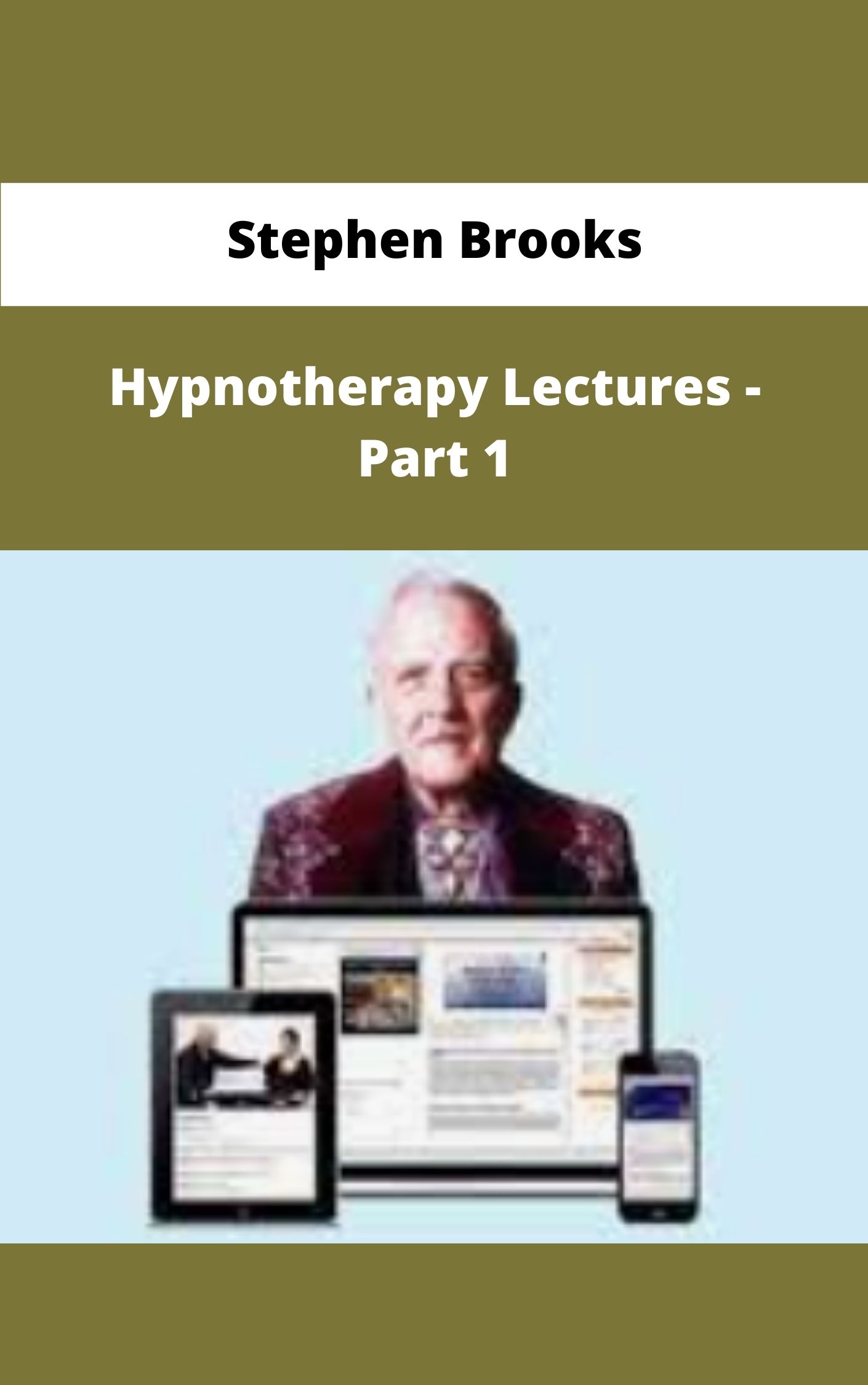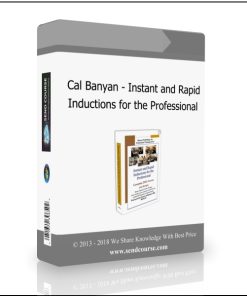Stephen Brooks – Hypnotherapy Lectures – Part 1 | Available Now !
$255.00 Original price was: $255.00.$119.00Current price is: $119.00.
Stephen Brooks – Hypnotherapy Lectures – Part 1 | Instant Download !
PLEASE CHECK VIDEO OF ALL CONTENTS:
The course is based on 120 essential skills and techniques covering the following areas:
Indirect Hypnosis Principles
– The Interactional Approach
– The Intrapersonal Approach
– Implication, compression and economic language
– Symptom Substitution and Resolution
– The Relationship Between Cause and Symptom
– Response Attentiveness
– Achieving Positive Outcomes
– Communicating with the Unconscious
– Identifying Verifiable Goals
– Values, Criteria and Beliefs
– Abreaction and Trauma
– Identifying Sabotage Strategies
– Therapeutic Orientation – Change or Improvement?
– Motivating the Patient to Stay in Therapy
– Future Pacing
– Secondary Gains and Indirect Benefits
– Weaning Patients Off Therapy
– Understanding the Patient’s metaphors
Get Stephen Brooks – Hypnotherapy Lectures – Part 1 right now!
– Contextualising Change
– Organic metaphors and Symptom Based metaphors
– Developing Advanced Strategies to Deal With Failure
– Pursuing Relevance
– The Structure of Learned Experience
– The Irrationality and Framing Model
– Contextual and Time frames
– Benefits and Costs
– The Laws of Attachment and Non-attachment
– Decision Making Personality Types
– Anchoring and Conditioning
– Feedback Loops
– The Laws of Reversed and Concentrated Effort
– The Laws of Positive Expectancy and Reinforcement
– The Laws of Observation, Utilization and Reframing
Indirect Hypnosis Techniques
– Hypnotic Time Distortion
– Favourite Activity and Leisure Trance Inductions
– Pseudo-Orientation in Time in Hypnosis
– Positive Negative Integration in Hypnosis
– The Third Person Dissociation
– Hypnotic Catalepsy
– Arm Levitation Inductions
– Automatic Writing in Hypnosis
– Unconscious Negotiation in Hypnosis
– Recalling Previous Trance as an Induction
– Surprise Technique Inductions
– Therapeutic metaphor
– The Multiple Mirror Therapeutic Induction
– Age Regression Techniques
– Paradoxical Intervention
– The Old Master Induction
– Indirect Utilisation of Sub-modalities
– Uptime Downtime Induction
– Utilising The Patient’s Needs As A Motivational Strategy
– Stop Smoking Strategy
– Inducing Amnesia
– The Self-Suggestion Induction
– Teaching Your Patient Self-Hypnosis
– The Four Seasons Induction
– Crystal Gazing and Multiple Screens
– Non Verbal Inductions
– Ideo-Motor Signaling
– The My Friend John Induction
– Cellular Healing Therapy
– The Early Learning Set Induction
– Scrambling Symptoms
– Ambiguous Task Assignments
– Eye Fixation and Distraction Inductions
– The Confusion Induction
– Deep Trance Identification
– Hypnosis for Pain Control and Anaesthesia
Indirect Hypnosis Skills
– Taking the Patient’s History
– High Quality Information Gathering
– Creating and Applying Therapeutic Nominalisations
– Recognising the Minimal Cues of Trance
– Creating Dependent Suggestions
– Open Questioning
– Positive and Reverse frames and Negative Tags
– Sorting for patterns of association
– Adjunctive Suggestions
– Calibrating to Positive & Negative Response Cues
– Responding to Polarity Responses
– Classes of Double Binds
– Passive Response Suggestions
– Using Therapeutic & Hypnotic Double Entendre
– Post Hypnotic Suggestions
– Serial Suggestions
– Challenging Negative Nominalisations
– Sensory Based Predicates
– Open-ended Suggestions
– Resource Accessing
– Facial Symmetry Calibration
– Insertive Eye Contact
– Recognising Patients’ Subjective Interpretations
– Casting Doubt and Challenging a Patient’s Interpretations
– Getting Video Descriptions and Sequence Responses
– Designing Therapeutic Tasks
– Prescribing and Delivering Tasks
– Developing a Compassionate Empowering Personality
Integrity and Ethics
– The importance of patient confidentiality
– Integrity and ethics within a hypnotherapy practice
– When it might be better to partner with a co-therapist
– How to maintain patient records
– When to terminate treatment
– Ethical and legal business management and practice
– The current status of hypnosis and codes of practice
– Medical and psychological contraindications of hypnosis
– The importance of requesting feedback and follow-up
– Recognition of psychiatric illnesses and when to refer
– Establishing clear guidelines regarding duration and cost
Practitioner Development
– CBT, humanistic and psychodynamic psychology
– Research methodology related to hypnosis
– The history of hypnosis as a therapeutic approach
– objective evaluation of professional skill development
– The need and value of supervision and ongoing training
– Basic physiology and anatomy
– Recent developments in brain science related to the mind
– Recognition of how previous treatment may affect therapy
The Hypnotic Relationship
– Developing a caring and sincere approach to those in need.
– Patients general health and lifestyle management.
– Appropriate social and relationship skills for patients.
– Local resources and support groups available to patients.
– Identifying the patient’s expectations regarding outcomes
– Transference and counter transference
– Motivating patients to be an active part of the treatment.
– Secondary or external influences that affect therapy
– Contextualizing treatment to the patient’s environment
– How to clearly communicate therapeutic options
– How emotions can affect patients decisions and perception
– How to negotiate mutually acceptable therapeutic outcomes
– Evaluating the effectiveness of treatment
These 10 Lectures in this part are:
01. Taking the Patient’s History
02. High Quality Information Gathering
03. Time Distortion
04. Favourite Activity and Leisure Trance Inductions
05. Creating and Applying Therapeutic Nominalisations
06. Pseudo-Orientation in Time
07. Recognising the Minimal Cues of Trance
08. Creating Dependent Suggestions
09. Open Questioning
10. Positive and Reverse frames
Stephen Brooks – Hypnotherapy Lectures – Part 1 Download, Hypnotherapy Lectures – Part 1 Download, Hypnotherapy Lectures – Part 1 Groupbuy, Hypnotherapy Lectures – Part 1 Free, Hypnotherapy Lectures – Part 1 Torrent, Hypnotherapy Lectures – Part 1 Course Download, Stephen Brooks – Hypnotherapy Lectures – Part 1 Review, Hypnotherapy Lectures – Part 1 Review
1 review for Stephen Brooks – Hypnotherapy Lectures – Part 1 | Available Now !
Add a review Cancel reply
Related products
Ecommerce
NLP & Hypnosis
Ecommerce
Ecommerce
Ecommerce
NLP & Hypnosis












Nash Kelley –
was very satisfied | Stephen Brooks – Hypnotherapy Lectures – Part 1